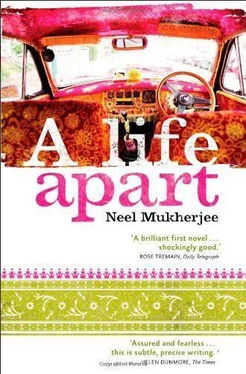Mr Roy Chowdhury obviously knows them for he gets off his horse with an ‘Excuse me, Miss Gilby, these are some of my tenants. Do you mind if I have a word or two with them? You can carry on ahead if you wish.’
He dismounts as Miss Gilby says, ‘If you don’t mind, I’ll just wait, shall I?’
The men greet Mr Roy Chowdhury with long salaam s. He, in turn, takes each man’s hand in his, individually, and lowers his head briefly. Miss Gilby is struck again by the respect with which Mr Roy Chowdhury treats everyone, his unshakeable sense of the dignity of every human being. The men cannot stop staring at her. She gives them a general smile, trots off a few paces ahead and waits while Mr Roy Chowdhury and the men exchange words, which sound to her agitated, concerned. At one point when she turns to look in their direction, she sees one of the men in what she can only term a supplicant’s position — arms outstretched and held up, palms open, much in the way Muslims pray to their Allah. Mr Roy Chowdhury speaks with both his hands clasped and held against his heart. From this distance, she cannot hear very much but it wouldn’t have made much of a difference even if she could for the local dialect is all but incomprehensible babble to her.
After several minutes, Mr Roy Chowdhury joins her, his arms now laden with the bundle of shaapla stems; half a dozen or so of those stems end in delicate flowers. His brows are furrowed, his eyes shaded.
‘Not very good news, I’m afraid, Miss Gilby. The salt factory I started last year is making heavy losses. It seems unfeasible now to keep it running for much longer. These men say that because locally produced salt costs more than British salt, they’re finding it difficult to sell it to customers. They are suffering losses too. They want me to shut down the factory and let them sell foreign-manufactured products.’
‘Did you agree?’
‘I never asked them to sell swadeshi products only. For the very brief period they did, their losses were so heavy that I immediately reverted. These men are very poor, they have to make a living somehow.’
There is a long silence. Mr Roy Chowdhury sighs again and attempts to introduce a lighter tone into the conversation. The effort is obvious. ‘Miss Gilby, I shouldn’t be heaping my petty concerns and burdens on you. I do apologize.’
Before Miss Gilby has a chance to protest, he continues, ‘You know, my late brother, Hrishikesh — he was the husband of Bimala’s naw jaa — he used to be part of this secret society called Sanjibani Sabha in the ’70s, when he was a teenager. The members tried to set up a match factory and a handloom. When I was a little boy, he used to tell me stories of how the matches refused to ignite and how the handloom produced just one towel, one towel only, before it had to be shut down. I used to find it funny. I still do, but in a different way.’
Miss Gilby is trying to think of an appropriate response when he points to the shaapla stems and says, ‘Shall we ask Bimala to get the cook to prepare this for lunch? Have you ever had this before? It’s usually added to a dal .’
They have reached the gardens of ‘Dighi Bari’. Miss Gilby understands that conversation on politics is terminated for the day. Bimala is supervising the malee at the flowerbeds and greets them with a radiant smile.
‘The Magpie’,
Wellesley Lane,
Velloor,
North Arcot,
25th September 1904
Dear Maud,
Where have you come across what you call ‘dark mutterings’ about the division of Bengal? Why are you concerning yourself with such matters? What exactly you hear — and I cannot, with any confidence, assert what it is you have gathered by way of gossip and unsubstantiated rumour — I do not know for you do not tell me. Instead you ask a lot of questions about an imminent partition of Bengal. I understand that His Excellency Lord Curzon, during his short tour of Bengal earlier on in the year, might have given out to be understood that ambitious schemes for a larger readjustment of Bengal were being considered. The Indian newspapers have been full of this, beating it up into a froth of meaningless frenzy so that their narrow partisan interests are served at the expense of the Government.
What I have gathered — and this might not be very much more than what you have gleaned from your own readings in Indian newspapers yourself — from conversations with people who might be involved with that burdensome and prickly project is already public, for the troublemakers in the Indian National Congress and various loose but no less seditious factions within Bengal have not ceased to trouble Her Majesty’s Government of India with petitions, letters, conferences, a veritable barrage of sound and fury, opposing the partition plan. The Bengalees, always a thorn in the side of the Government, like the Mahrattas, like to think themselves a nation, and dream of a future when the English will have been turned out, and a Bengalee Babu installed in the Government House, Calcutta. They will, of course, bitterly resent any disruption that will be likely to interfere with the realization of this dream. If we are weak enough to yield to their clamour now, we shall not be able to dismember or reduce Bengal again; the result will be a cementing and solidifying, on the eastern flank of India, a force already formidable, and certain to be a source of increasing trouble in the future.
The diminution of the power of Bengalee political agitation will assist to remove a serious cause for anxiety: it is the growing power of a population with great intellectual gifts and a talent for making itself heard, a population which, though it is very far from representing the more manly characteristics of the many races of India, is not unlikely to influence public opinion at Home most mischievously. I notice even now that Bengalees, with their genius for intrigue, have already found their own advantage and are indulging their instinct in stirring up strife, so everything has to be done as
arcana imperii
. From a political point of view alone, putting aside the enormous administrative difficulties — which are better left to men who understand them best because they are complex, intricate and too difficult for women’s gentle and delicate minds to comprehend — that an undivided Bengal continues to present, partition is most necessary.
The Bengalee race, and most predominantly, its power-hungry and overeducated Hindoo population — for it is the Hindoo population that constitutes the political voice of the Presidency, the Mohammedans having remained inactive so far — is given to conspiracies and endless schemes to consolidate its power and dominance over that Presidency. Bengal united is a power; Bengal divided will pull in several different ways: that is the current wisdom among us and almost wholly justifies any scheme for division. It is uniformly accepted and acknowledged, although no one will put it down on paper, that one of our main objects is to split up and thereby weaken a solid body of opponents to our rule.
What the exact lines of division are going to be, which areas and districts will constitute the new Province of East Bengal, these are unknown to me for they are still in a state of flux and subject to endless discussions, but I gather that the district of Bograh, along with Rungpoor and Pubna — all your neck of the woods, as it were — are going to be transferred to the new Province. Simla might change all that. There seems to be a great air of secrecy and furtiveness about the whole business.
Don’t worry yourself too greatly with these matters, the Bengalee Babu is wont to see tigers behind settees when there are none, and accordingly create comparable frenzy and frantic politicking. As with all these things, the division, if and when it happens, will pass peacefully: Bengal will make a noise for a few weeks and then acquiesce.
Читать дальше












